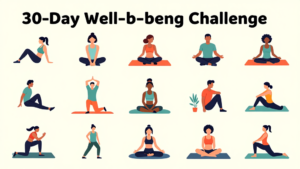10 Essential Self-Care Practices for a Balanced Life

Self-care is essential for maintaining a balanced life and overall well-being. It allows individuals to recharge, manage stress, and enhance productivity in both personal and professional spheres. As one expert notes, “Prioritizing self-care is not selfish; it’s necessary for sustaining health and happiness.” Engaging in self-care practices has numerous benefits, including improved mental health, enhanced self-confidence, and better relationships. By incorporating self-care into daily routines, individuals can cultivate a healthier lifestyle and foster resilience in the face of challenges.
Prioritize Sleep
Sleep plays a crucial role in both mental and physical health. Adequate sleep is essential for cognitive functions, emotional regulation, and overall well-being. On the flip side, lack of sleep can lead to increased stress, anxiety, and mood disorders, negatively impacting mental health. Physical health also suffers; insufficient sleep can contribute to conditions like obesity, diabetes, and heart disease.
Understanding your sleep needs is vital. The following table outlines the recommended hours of sleep by age group:
| Age Group | Recommended Hours |
|---|---|
| Newborns (0-3 months) | 14-17 hours |
| Infants (4-11 months) | 12-15 hours |
| Children (1-2 years) | 11-14 hours |
| Preschoolers (3-5 years) | 10-13 hours |
| School-age children (6-13 years) | 9-11 hours |
| Teenagers (14-17 years) | 8-10 hours |
| Adults (18-64 years) | 7-9 hours |
| Elderly (65+ years) | 7-8 hours |
To improve sleep quality, consider creating a sleep-friendly environment. Invest in a good mattress and bedding, and establish a consistent sleep routine. Techniques such as using sleep apps or blue light blocking glasses can help regulate your sleep cycles. Prioritizing sleep will enhance both mental clarity and physical vitality.
Mindful Eating
The connection between diet and mental well-being is profound. Research shows that what we eat can significantly affect our mood and overall mental health. Adopting a mindful eating approach can enhance this connection, fostering a healthier relationship with food.
“Mindful eating encourages us to fully engage with our food, leading to better emotional regulation and improved well-being.”
To practice mindful eating, consider the following principles:
Eat slowly and without distraction.
Listen to your body’s hunger cues and stop when full.
Engage your senses by noticing colors, smells, and flavors of the food.
Acknowledge and cope with any guilt or anxiety related to food.
Focus on the effects that food has on your feelings and body.
A well-balanced diet, rich in whole grains, fruits, and vegetables, is essential for maintaining good health. It provides necessary nutrients and supports mental clarity, energy levels, and emotional stability, ultimately leading to a more balanced life.
Regular Exercise
Regular exercise is a cornerstone of effective self-care. It significantly impacts both stress and mood. Engaging in physical activity helps release endorphins, which are natural mood lifters. In fact, studies show that just 30 minutes of moderate exercise five times a week can lead to considerable mental health benefits.
Different types of exercise cater to various fitness levels. For beginners, low-intensity aerobic exercises such as walking or light swimming are ideal. Intermediate exercisers might opt for moderate-intensity activities like jogging or dancing. Those with advanced fitness can challenge themselves with vigorous-intensity workouts, such as running or swimming laps.
Statistics underscore the importance of exercise for mental well-being. A review of over 1,000 studies found that 89% linked physical activity to positive mental health outcomes. This includes reductions in symptoms of depression and anxiety, highlighting exercise as an effective strategy for enhancing emotional resilience.
Meditation and Mindfulness

Meditation is a powerful tool for enhancing mental clarity and overall cognitive function. Regular practice can lengthen your attention span, improve self-awareness, and support emotional health. For instance, focused attention meditation strengthens your ability to concentrate, similar to weightlifting for your mind.
Research shows that mindfulness practices can significantly reduce stress. A systematic review found that mindfulness-based interventions effectively decrease anxiety, depression, and stress levels, particularly among healthcare professionals. In fact, over 30 studies demonstrated the benefits of these practices in enhancing well-being.
To get started, try these simple mindfulness exercises:
The Raisin Exercise: Observe a raisin with all your senses.
The Body Scan: Bring awareness to each part of your body.
Mindful Seeing: Focus on the colors and movements outside a window.
Mindful Listening: Share thoughts in a group while others listen attentively.
Five Senses Exercise: Identify things you can see, feel, hear, smell, and taste.
Incorporating these practices into your daily routine can lead to improved emotional health and cognitive function.
Connect with Nature
“In every walk with nature, one receives far more than he seeks.” – John Muir
Connecting with nature has profound effects on mental health. Research indicates that spending time outdoors can enhance cognitive functions, reducing stress and improving mood. Natural environments have been linked to increased happiness and a sense of purpose, while urban settings often correlate with mental distress. Studies show that children with access to green spaces exhibit better cognitive development.
Incorporating nature into daily life is easier than you might think. Start by adding indoor plants to your home, or create a cozy spot by a window to soak in natural light. Consider journaling about your experiences in nature or growing an indoor herb garden. Even simple activities like listening to nature sounds can elevate your mood. Practical methods such as these can help you stay connected to the natural world.
Numerous studies support these benefits. For instance, children with access to green spaces show better cognitive development. Additionally, adults in greener neighborhoods report higher attentional functioning, while a lack of exposure to nature during childhood increases the risk of mental health issues later in life. These findings underscore the importance of making nature a priority in our lives.
Foster Social Connections
Strong relationships are vital for mental health and well-being. Studies show that individuals with robust social connections tend to have lower levels of anxiety and depression. In fact, a study found that those with strong social ties have a 50% greater chance of living longer compared to those with weaker connections. This highlights the profound impact that relationships can have on overall health.
To strengthen your social bonds, consider the following practical strategies:
Schedule regular catch-ups with friends or family, whether in person or via video calls.
Join clubs or groups that align with your interests to meet new people.
Volunteer for community service, fostering connections while giving back.
Engage in shared hobbies or activities, such as sports or crafting.
Practice active listening to deepen conversations and understanding.
By nurturing these connections, you not only enhance your social life but also contribute positively to your mental health. Remember, the quality of your relationships matters just as much as the quantity, so invest time in those who uplift and inspire you.
Conclusion and Final Thoughts
Self-care is essential for maintaining a balanced life and nurturing both your mental and physical health. By prioritizing practices such as time spent in nature, mindful eating, and ensuring adequate sleep, you can significantly enhance your well-being. Remember, even small changes can lead to substantial improvements in your quality of life.
Now is the time to take action. Choose one or two self-care practices from this guide and implement them into your daily routine. Your journey to a more balanced life starts today!






